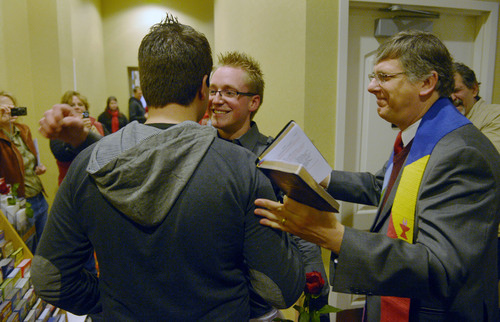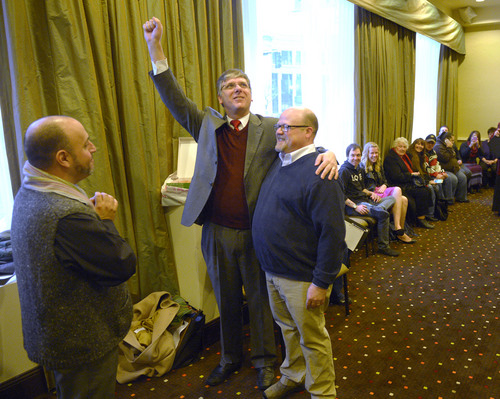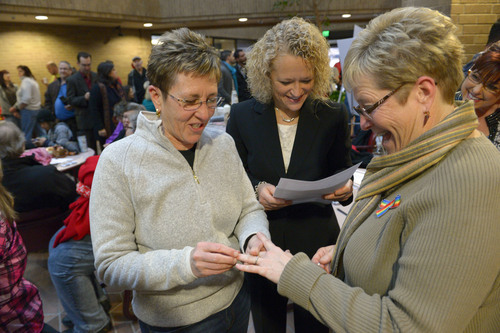This is an archived article that was published on sltrib.com in 2013, and information in the article may be outdated. It is provided only for personal research purposes and may not be reprinted.
Same-sex marriage has been legal in Utah for less than a week, and already, the state is running out of options to stop it.
Late Tuesday, the 10th Circuit Court in Denver denied Utah's request to put a halt to the marriages, hundreds of which have been happening throughout the state since Friday.
According to the order, the state failed to demonstrate it was suffering "irreparable harm" as a result of the legalization of same-sex marriage and also failed to show it had a "significant likelihood" of prevailing in its appeal to the circuit court.
The appeal asks the high court to overturn U.S. District Judge Robert J. Shelby's ruling that overturned Utah's constitutional amendment banning same-sex unions.
But given Tuesday's decision, which declares the state isn't "significantly likely" to win its appeal to the 10th Circuit, experts said, a reversal of Shelby's ruling seems dubious.
Acting Attorney General Brian Tarbet told The Salt Lake Tribune moments after the decision that the state would appeal to the U.S. Supreme Court, in hopes of obtaining an order to stay, which would immediately put a stop to gay and lesbian couples being granted marriage licenses.
He said a motion was being prepared and would be ready to go by Thursday.
"I wouldn't say [the 10th Circuit's decision] comes as a surprise," Tarbet said.
Because each circuit court is assigned to a Supreme Court justice, Utah will be appealing to Justice Sonia Sotomayor.
Sotomayor will have the option of considering the state's request herself or referring it to the full court. If she considers, and subsequently denies, the state's request for a stay, Utah's last option is appealing to the Supreme Court itself.
Tarbet said the state is prepared to do just that.
University of Utah law professor Cliff Rosky, who also serves on Equality Utah's board of directors, said the standard for receiving a stay from the U.S. Supreme Court is much higher — and more difficult — than receiving a similar order from the district court or appeals court, both of which have already refused to stop same-sex marriages in Utah.
The state would have to prove the 10th Circuit Court "clearly and demonstrably" erred in refusing to halt same-sex marriage in this case.
"It's basically asking, Was the 10th Circuit's decision reasonable? Could a reasonable argument be made for making the decision the 10th Circuit made?" Rosky said. "It doesn't matter if the Supreme Court agrees with the ruling, what matters if it was reasonable. If it was, it stands."
Thursday's motion will be Utah's fifth attempt at getting a stay imposed to stop gay and lesbian weddings.
Peggy Tomsic, who represents the six plaintiffs in the Kitchen v. Herbert lawsuit, said the high court's decision Tuesday left her speechless, and serves as an early Christmas present to her clients.
"I was just like, 'wow.' It gives me such confidence to see our judicial system following the letter of the law ... in the face of such a high-pressure, volatile issue," Tomsic told The Tribune. "It indicates to me that [the courts] realize the magnitude of this issue."
Included in the denial, issued by Judge Robert E. Bacharach and Judge Jerome A. Holmes, was an order to expedite the court's "consideration of this appeal."
That means the court will waste no time in moving along Utah's appeal and could hear the case in a matter of months.
"They're moving ahead quickly and have already stated — in this most recent denial — that the state is not likely to prevail on an appeal," Rosky said. "If the 10th deny's the state's appeal, that would mean not just one court, but two federal courts believe state laws banning same-sex marriage are unconstitutional."
Utah filed its emergency stay request with the 10th Circuit on Monday — barely an hour after Shelby denied a similar move to halt same-sex marriages due to Utah's concern over the "status quo" and the "irreparable harm" these marriages stand to cause to the state and its citizens.
The longer same-sex marriage is allowed to continue in Utah, the more licenses will likely be issued and the more couples will likely wed. All but four counties in Utah were issuing same-sex marriage licenses Tuesday.
It was not immediately clear how the appellate court's decision would influence the four holdouts.
"Time is of the essence to stop these marriages by staying the district court's injunction," according to the state's motion. "[Same-sex marriages must be stopped] in order to maintain the historic status quo of man-woman marriage that the state and its citizens validly enshrined in the Utah Constitution."
According to an email from Gov. Gary Herbert's office to his cabinet Tuesday afternoon, most state agencies are seeing "minimal or no impact" as a result of same-sex marriages taking place.
The appeals court is not expected to decide whether to overturn Shelby's decision for at least a few months. Utah was seeking a stay to prevent more same-sex marriages from happening until that case is decided.
Marriages granted since Friday will be unaffected by any ruling granting a stay, according to legal experts.
"Right now," Tomsic said, "the status quo in Utah is hundreds and hundreds of same-sex couples have been granted licenses and are now married."
Twitter: @Marissa_Jae







